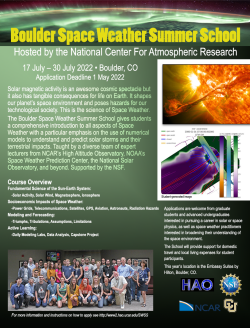2022 Boulder Space Weather Summer School
FYI, we will not be holding a Space Weather Summer School in 2023. We hope to resume in 2024.
What is the SWSS?
The Boulder Space Weather Summer School (SWSS), previously known as the CISM Space Weather Summer School, is a two-week program that gives students a comprehensive introduction to the science of space weather: what it is, what it does, and what can be done about it.
Space weather is many things: beautiful when seen through the eyes of a solar telescope, fascinating when studied for its alien worlds of magnetic structures and phenomena, awesome when witnessed as a solar eruption or auroral storm, and devastating to the users of services it disrupts. Space weather links the Sun, the Earth, and the space in between in a branching chain of consequences. Weather systems on the Sun can spawn interplanetary storms of colossal size and energy that envelop entire planets in electrical "hurricanes." When such storms strike Earth, they can disrupt the complex, interconnected technological, infrastructure that allows modern society to function.
Spaceship Earth is wired for power, linked for communications, networked for information, and serviced by squadrons of satellites. All these make up a space-vulnerable technological environment. As we enter the new millennium, we grow more reliant on this environment while it grows more susceptible to disruptions from space weather.
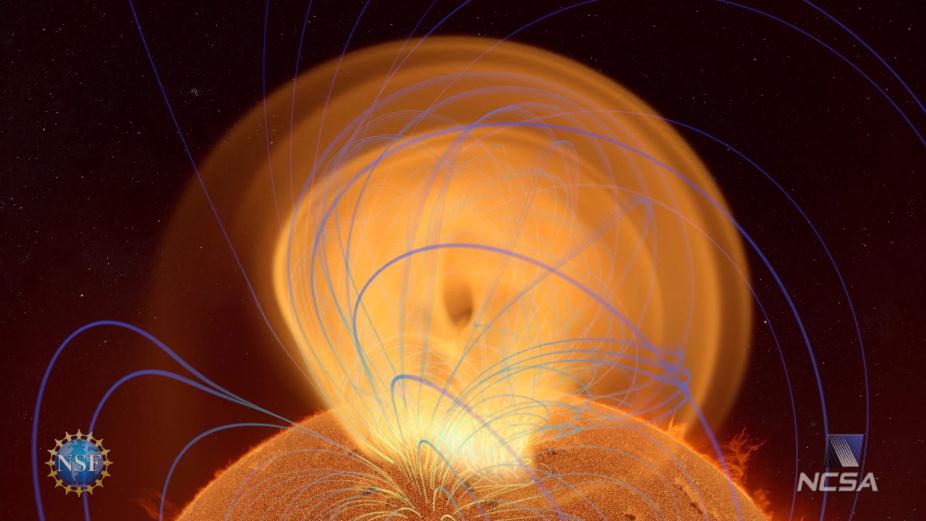
Coronal Mass Ejection (CME) simulation by Y. Fan (HAO/NCAR). Visualization by the Advanced Visualization Lab at NCSA/Univ. Illinois (D. Cox et al.), with financial support from NSF.
The SWSS was founded in connection with the Center for Integrated Space Modeling (CISM), which was an active NSF Science and Technology Center from 2002 to 2013, headquartered at Boston University in Massachusetts. Now the SWSS is a separate NSF-funded program administrated by the High Altitude Observatory (HAO). HAO is a division of the National Center for Atmospheric Research (NCAR) concerned with investigating the origins and manifestations of solar magnetic activity and its influence on Earth's atmosphere and space environment. The SWSS has been held every summer since 2001 and it has been held in beautiful Boulder, Colorado, since 2012.
Why Boulder?
The SWSS will switch venues this year to the Embassy Suites by Hilton in Boulder, Colorado. Boulder is the home to multiple government, academic, and private research institutions and is one of the foremost hubs of solar and space science in the US and in the world.
The SWSS is a partnership between several of these local institutions, including:
- NCAR's High Altitude Observatory (HAO)
- The Space Weather Prediction Center (SWPC), a component of the National Oceanic and Atmospheric Administration (NOAA) and the National Weather Service (NWS)
- The National Solar Observatory (NSO)
- The University of Colorado's Space Weather Technology, Research, and Education Center (SW-TREC)
Funding for the SWSS is provided by the National Science Foundation. In addition to these partner institutions, Boulder also hosts the University of Colorado's Laboratory of Atmospheric and Space Physics (LASP), the Southwest Research Institute, and much more. It is also a gateway to the Rocky Mountains, offering a wealth of opportunities for outdoor and indoor recreation.
Whom will I meet?
The SWSS is targeted at beginning graduate students and advanced undergraduates who are considering a career in solar, space, atmospheric, or related sciences. It is also open to space weather practitioners in government and industry who are interested in enriching their understanding of the solar-terrestrial system and the causes and impacts of space weather events. Admission is open to both US and international students, though the SWSS cannot provide support for international travel. Enrollment is limited to about 30 students each year.
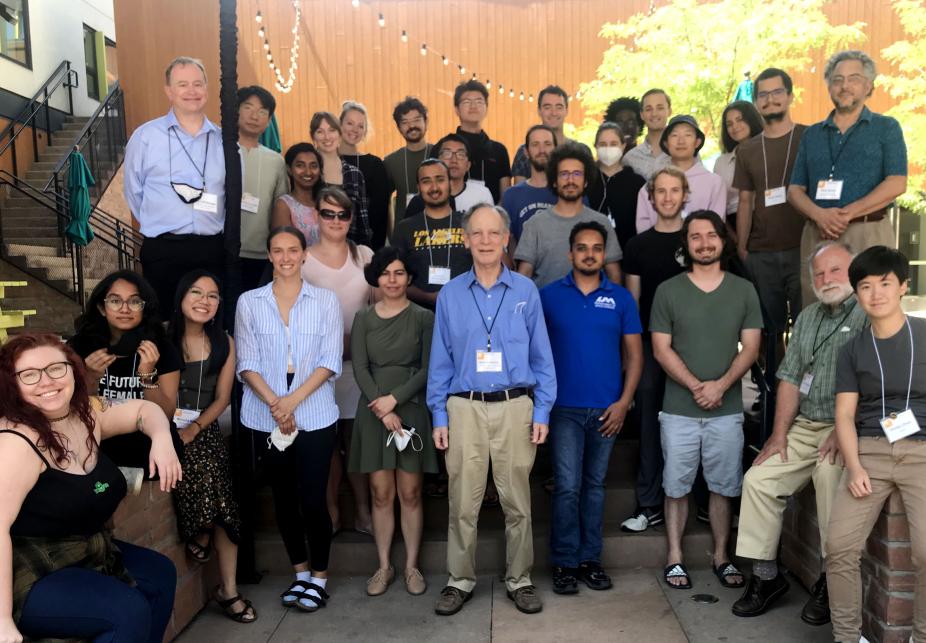
SWSS class of 2022.
Lecturers are content experts from our partner institutions (noted in section above) as well as other research centers, universities, and private companies throughout the U.S. Students will also have the opportunity to attend a networking event in which they can further interact with our lecturer team and meet other members of the vibrant solar and space physics community in Boulder.
What will I learn?
The SWSS curriculum stands out for its distinctive integration of the fundamental science of the Sun-Earth system and the socioeconomic impacts of space weather, with a particular emphasis on modeling and forecasting. It provides a unique, immersive experience that supplements undergraduate and graduate coursework on physics, Earth and atmospheric sciences, astronomy, and space science.
Each morning, students will engage in a series of interactive lectures spanning three over-arching themes:
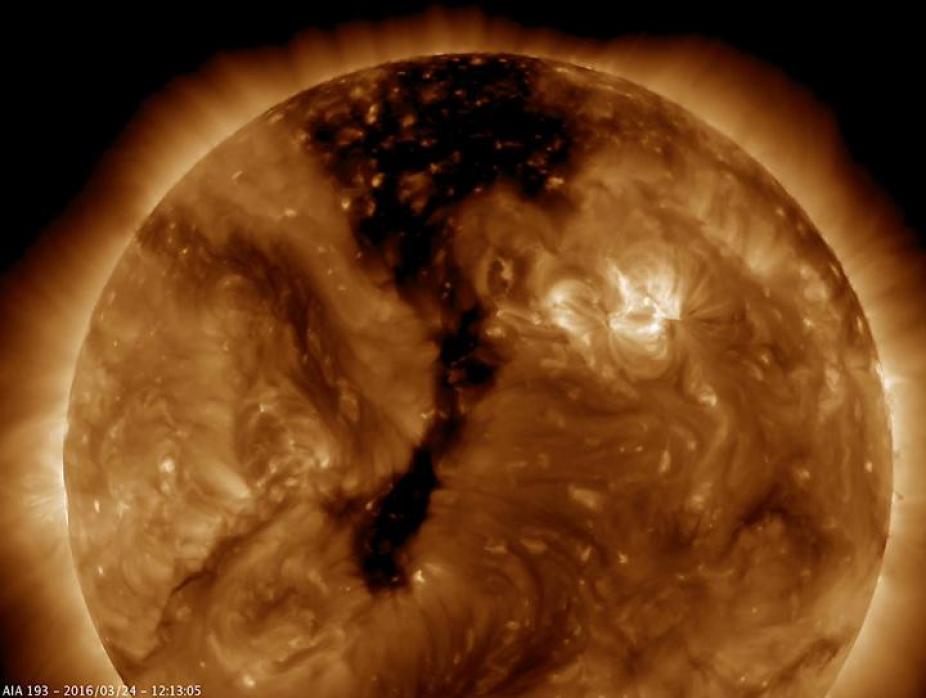
UV image of the solar corona from the AIA instrument on NASA’s Solar Dynamics Observatory (SDO) highlighting an elongated, low-latitude coronal hole, the source of the fast solar wind.
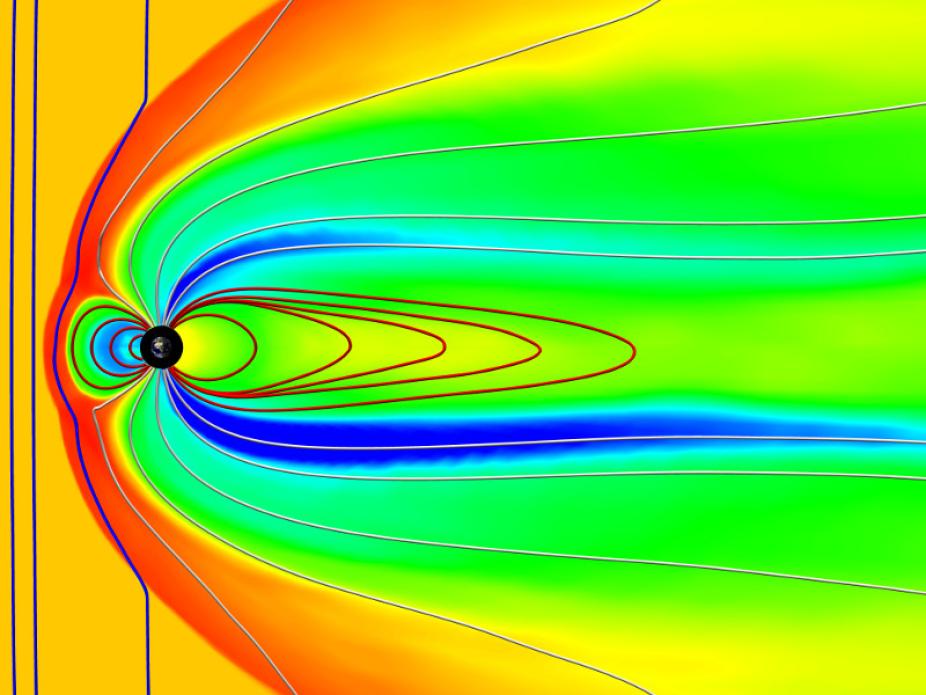
Numerical simulation of the Earth's magnetosphere, shaped by the solar wind.
Micheal Wiltberger, HAO/NCAR
- SW 101: The Solar-Terrestrial System
Covering the origins and manifestations of solar magnetic activity and its influence on the Earth's atmosphere and space environment, including- The solar interior and dynamo
- Magnetic flux emergence and photospheric active regions (sunspots!)
- The solar chromosphere and corona
- Solar wind acceleration and propagation
- Eruptive events, including flares and coronal mass ejections (CMEs)
- The heliosphere
- The Earth's magnetosphere and ionosphere
- Coupling of space weather phenomena between the upper and lower atmosphere
- Solar irradiance and climate
- SW 102: Space Weather Effects and Consequences
Covering the impact of space weather on our technological society, including:- Electrical power grids
- Satellites
- Satellite navigation systems such as GPS
- Telecommunications and radio blackouts
- Radiation hazards to astronauts, airline crews, and airline passengers
- Effects on economic sectors including power, aviation, transportation, communications, finance, and others
- How should government and industry respond to space weather hazards?
- SW 103: Modeling and Forecasting
Covering how scientists and forecasters use computer models to understand and predict space weather events- The equations of magnetohydrodynamics (MHD)
- Numerical methods
- Model assumptions and inputs
- Assimilation of observational data
- Model limitations
- Visualization, analysis, and interpretation of model outputs
- How accurate are current forecasts?
- What can we do to improve forecast accuracy?
Each afternoon, students engage in project-based activities (informally referred to as modeling labs) designed to highlight various aspects of our three overarching themes (SW 101, 102, and 103). During these activities, students learn how to use a variety of operational and pedagogical models to make space weather predictions; —they get the opportunity to work with observational data from a range of missions and instruments, including SDO, SOHO, ACE, ULYSSES, GOES, DSCOVR, and the Van Allen Probes.
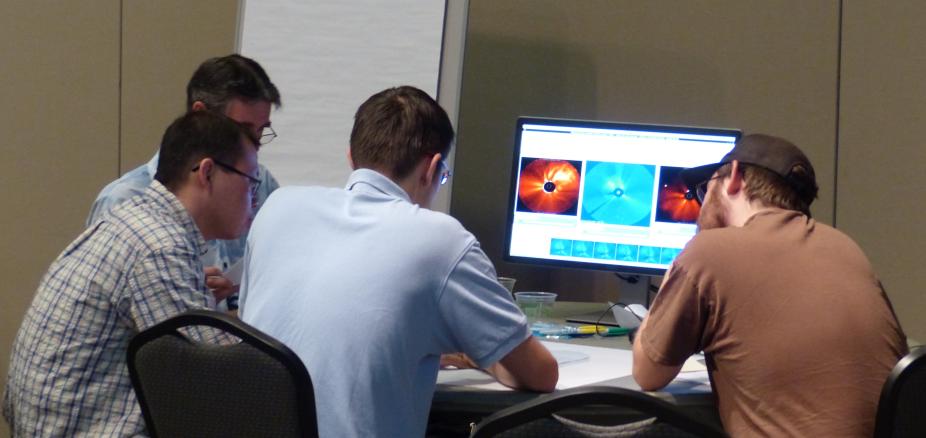
SWSS students hard at work on a modeling lab (2015).
- Example Activities
...that have appeared in previous years include:- Introduction to visualization
- Exploring the structure of the solar magnetic field
- Sources of the solar wind
- Exploring the structure of the solar wind
- Predicting the arrival of CMEs at Earth
- Exploring the Magnetosphere
- Particle motions in the Magnetosphere
- Satellite drag
- Exploring the Ionosphere and Thermosphere
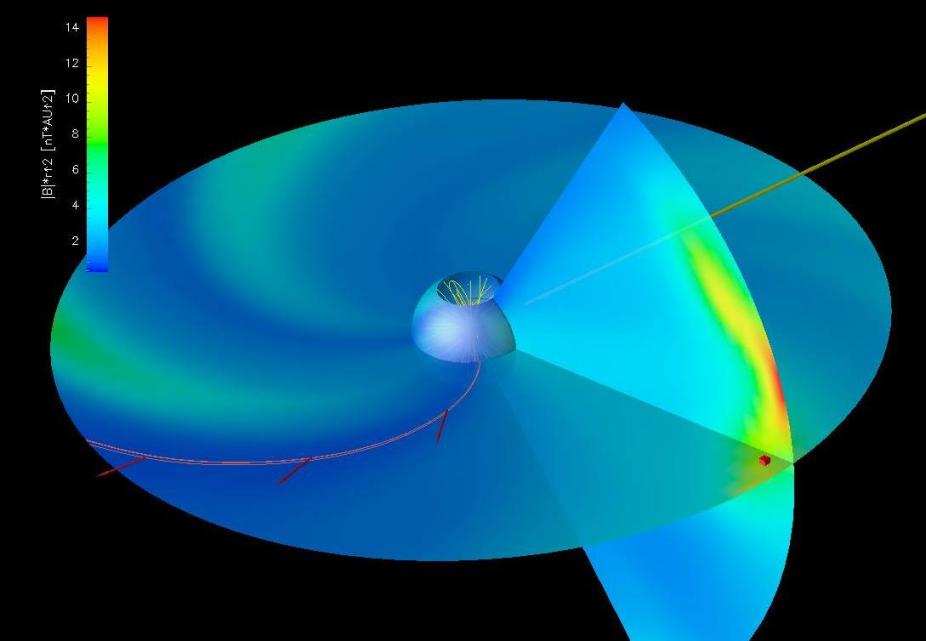
Student-produced visualization of a solar wind model, highlighting a co-rotating interaction region (CIR) heading toward Earth (2017).
The last day of the School is devoted entirely to a Capstone Project in which students analyze an actual space weather event and hindcast its terrestrial impact.
Students will be selected based on suitability of research and career interests, adequate scientific and technical preparation, and potential to contribute productively to future national and international Space Weather endeavors. SWSS is committed to widening access by welcoming applications from applicants with non-traditional backgrounds. Individuals from diverse backgrounds are encouraged to apply.
All students who are admitted to the School will be provided housing at the Embassy Suites sharing double queen rooms. The meeting room is also located at the hotel. In addition to housing expenses, all students will be given a sufficient stipend (precise amount to be determined) to cover meal costs that are not otherwise provided by the School. The hotel includes a hot breakfast bar and lunch will be catered from Monday to Friday. UCAR policy requires all visitors be vaccinated against COVID-19 and students accepted into the school will be required to provide proof of vaccination.
The SWSS will also provide funding for admitted U.S. students to support travel from their home institutions to Boulder, Colorado. (and back!). Funding is not available to support international travel; all admitted international students will be responsible for arranging their own travel expenses through their home institutions.
Contact Wendy Hawkins, or "whawkins" at "ucar.edu" for more information.
